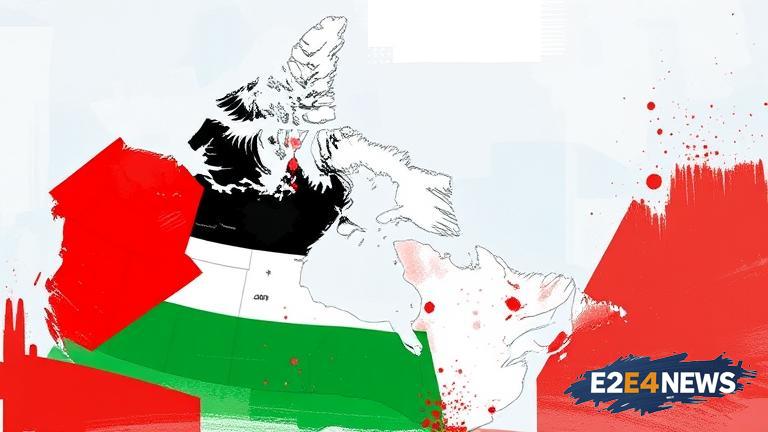In a historic move, Canada has officially recognized the State of Palestine, joining a growing list of countries that have acknowledged Palestine’s sovereignty. This decision marks a significant shift in Canada’s foreign policy, as the country had previously been a strong supporter of Israel. The recognition of Palestine as a state is a major victory for the Palestinian people, who have been fighting for their rights and independence for decades. The move is also seen as a significant step towards a two-state solution, which has been the cornerstone of international efforts to resolve the Israeli-Palestinian conflict. Canada’s recognition of Palestine is expected to have far-reaching implications, both domestically and internationally. The decision is likely to be welcomed by the Palestinian Authority, which has been seeking international recognition of its statehood. The move is also expected to be met with opposition from Israel, which has long opposed the recognition of Palestine as a state. The Israeli government has argued that recognition of Palestine would undermine the peace process and create a precedent for other countries to follow suit. Despite this, Canada’s decision to recognize Palestine is seen as a significant step towards a more balanced and equitable approach to the conflict. The recognition of Palestine is also expected to have implications for Canada’s relationships with other countries in the region, including Israel and the United States. The US has long been a strong supporter of Israel, and Canada’s decision to recognize Palestine may create tensions between the two countries. However, Canada’s move is also seen as a reflection of the country’s commitment to human rights and international law. The recognition of Palestine is a major victory for human rights activists and organizations that have been advocating for Palestinian rights for decades. The move is also expected to have implications for Canada’s domestic politics, with some politicians hailing the decision as a major breakthrough and others criticizing it as a mistake. The recognition of Palestine is a complex issue that has been debated for decades, with different countries and organizations having different opinions on the matter. The international community has long recognized the Palestinian people’s right to self-determination, but the question of whether Palestine should be recognized as a state has been a subject of controversy. Canada’s decision to recognize Palestine is seen as a significant step towards resolving the conflict, but it is also expected to be met with opposition from some quarters. The recognition of Palestine is a major development in the Israeli-Palestinian conflict, and it is likely to have far-reaching implications for the region and the world. The move is expected to be welcomed by the international community, which has long been seeking a resolution to the conflict. The recognition of Palestine is also seen as a reflection of Canada’s commitment to peace and stability in the region. The country has long been a strong supporter of the peace process, and its decision to recognize Palestine is seen as a major step towards achieving a lasting peace. The recognition of Palestine is a complex issue that requires a nuanced and balanced approach, and Canada’s decision to recognize Palestine is seen as a significant step towards achieving this goal. The move is expected to be met with a mix of reactions, with some countries and organizations welcoming the decision and others criticizing it. However, Canada’s decision to recognize Palestine is seen as a major breakthrough in the quest for peace and stability in the region.
